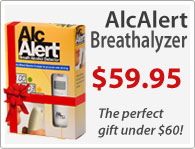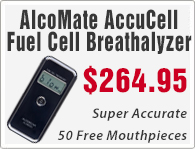Resources & Services
Breathalyzer Accuracy
-
Breathalyzer accuracy is a topic that gets brought up a lot when speaking with our customers. What kind of accuracy do law enforcement agencies use? How accurate are consumer breathalyzers and do keychain breathalyzers really work? Since breathalyzers have become the most popular way to test for BAC (blood alcohol content), it is important to know how accurate these alcohol tests really are.
In this article we will quickly discuss the types of sensor technologies one may find in a modern breathalyzer and how they compare to each other. It is important to note that no matter how accurate a breathalyzer is, if the device reads any alcohol, you should never let that person or yourself behind the wheel of a vehicle. A breathalyzer is an instrument to use as a tool to better inform you of your BAC, not a license to get behind the wheel of a vehicle.
How accurate are law enforcement breathalyzers?
Typically in the United States, there are two types of breathalyzers used by law enforcement agencies, alcohol screening devices and evidential breathalyzers. The most common device used is your typical alcohol screening device that will use either a fuel cell sensor or semiconductor sensor. These devices must be approved by the DOT as qualifying for alcohol screening. They must maintain an accuracy rating with a margin of error of at least +/- .01% at 0.08% BAC. Most breathalyzer today, including the AlcoMate Premium meet these requirements and are approved for screening purposes. Some law enforcement agencies use breathalyzers utilizing a fuel cell sensor, similar to the one found in the AlcoMate AccuCell breathalyzer. These devices exceed DOT requirements by having a margin of error of +/- .005% at 0.08% BAC. Evidential breathalyzers aren’t per se more accurate, but they have added checks and functions that screening devices do not have. Evidential breathalyzers can use fuel cell sensors or infrared spectrometers in a desktop form. No hand held breathalyzer qualifies as an evidential tester in the United States. Built in printers and routine calibration are some of the other requirements for an evidential unit. |

How accurate are consumer level breathalyzers?
There are a wide variety of breathalyzers available in today’s market. Some meet and exceed DOT requirements while others barely pass as functioning breathalyzers. It is important to know where your breathalyzer comes from. Today the best breathalyzers are made in the United States, South Korea, and Japan. Not to say Chinese breathalyzers are not as accurate or functional, they just lack reliability and shelf life. It is our recommendation to not purchase any digital breathalyzer under $50. A lot of these breathalyzers make their rounds in the office, and they never hold up to any standard (especially the DOT). |
How can I make sure I am getting the most accurate results?
You always want to follow proper testing procedures that can be found in the instructions provided. To ensure accurate test results, you must wait at least 20 minutes from the time of your last drink. Doing so ensures you are testing for the alcohol deep within your lungs and not from any alcohol residue left in your mouth. This greatly reduces any chance of false positives and sensor saturation. Always make sure your breathalyzer is calibrated. Breathalyzer calibrations restore factory settings so your device displays accurate results. Some models like the AlcoMate Premium or AlcoMate Prestige do not need calibrations, but instead have a sensor module that is replaced when the device becomes inaccurate. |





